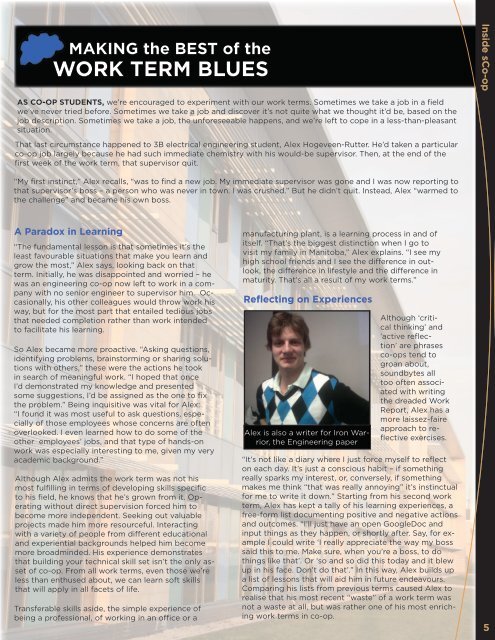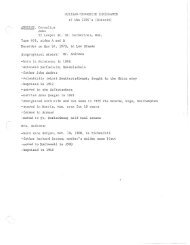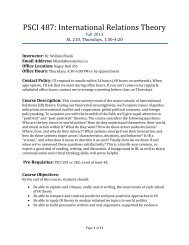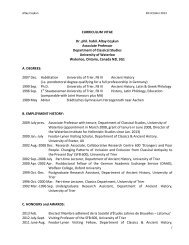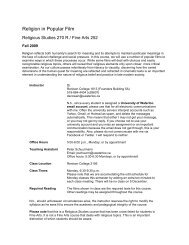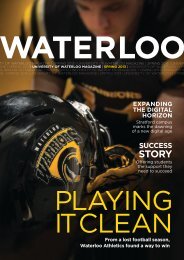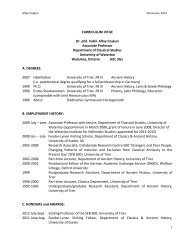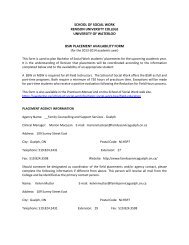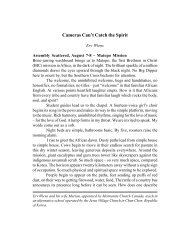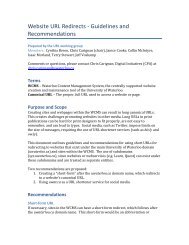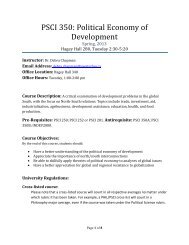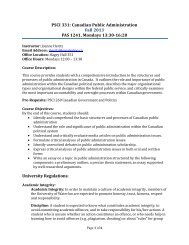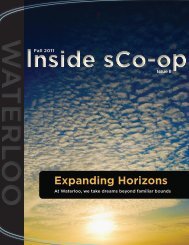CHALLENGE - University of Waterloo
CHALLENGE - University of Waterloo
CHALLENGE - University of Waterloo
You also want an ePaper? Increase the reach of your titles
YUMPU automatically turns print PDFs into web optimized ePapers that Google loves.
MAKING the BEST <strong>of</strong> the<br />
WORK TERM BLUES<br />
Inside sCo-op<br />
AS CO-OP STUDENTS, we’re encouraged to experiment with our work terms. Sometimes we take a job in a field<br />
we’ve never tried before. Sometimes we take a job and discover it’s not quite what we thought it’d be, based on the<br />
job description. Sometimes we take a job, the unforeseeable happens, and we’re left to cope in a less-than-pleasant<br />
situation.<br />
That last circumstance happened to 3B electrical engineering student, Alex Hogeveen-Rutter. He’d taken a particular<br />
co-op job largely because he had such immediate chemistry with his would-be supervisor. Then, at the end <strong>of</strong> the<br />
first week <strong>of</strong> the work term, that supervisor quit.<br />
“My first instinct,” Alex recalls, “was to find a new job. My immediate supervisor was gone and I was now reporting to<br />
that supervisor’s boss – a person who was never in town. I was crushed.” But he didn’t quit. Instead, Alex “warmed to<br />
the challenge” and became his own boss.<br />
A Paradox in Learning<br />
“The fundamental lesson is that sometimes it’s the<br />
least favourable situations that make you learn and<br />
grow the most,” Alex says, looking back on that<br />
term. Initially, he was disappointed and worried – he<br />
was an engineering co-op now left to work in a company<br />
with no senior engineer to supervisor him. Occasionally,<br />
his other colleagues would throw work his<br />
way, but for the most part that entailed tedious jobs<br />
that needed completion rather than work intended<br />
to facilitate his learning.<br />
So Alex became more proactive. “Asking questions,<br />
identifying problems, brainstorming or sharing solutions<br />
with others,” these were the actions he took<br />
in search <strong>of</strong> meaningful work. “I hoped that once<br />
I’d demonstrated my knowledge and presented<br />
some suggestions, I’d be assigned as the one to fix<br />
the problem.” Being inquisitive was vital for Alex:<br />
“I found it was most useful to ask questions, especially<br />
<strong>of</strong> those employees whose concerns are <strong>of</strong>ten<br />
overlooked. I even learned how to do some <strong>of</strong> the<br />
other employees’ jobs, and that type <strong>of</strong> hands-on<br />
work was especially interesting to me, given my very<br />
academic background.”<br />
Although Alex admits the work term was not his<br />
most fulfilling in terms <strong>of</strong> developing skills specific<br />
to his field, he knows that he’s grown from it. Operating<br />
without direct supervision forced him to<br />
become more independent. Seeking out valuable<br />
projects made him more resourceful. Interacting<br />
with a variety <strong>of</strong> people from different educational<br />
and experiential backgrounds helped him become<br />
more broadminded. His experience demonstrates<br />
that building your technical skill set isn’t the only asset<br />
<strong>of</strong> co-op. From all work terms, even those we’re<br />
less than enthused about, we can learn s<strong>of</strong>t skills<br />
that will apply in all facets <strong>of</strong> life.<br />
Transferable skills aside, the simple experience <strong>of</strong><br />
being a pr<strong>of</strong>essional, <strong>of</strong> working in an <strong>of</strong>fice or a<br />
manufacturing plant, is a learning process in and <strong>of</strong><br />
itself. “That’s the biggest distinction when I go to<br />
visit my family in Manitoba,” Alex explains. “I see my<br />
high school friends and I see the difference in outlook,<br />
the difference in lifestyle and the difference in<br />
maturity. That’s all a result <strong>of</strong> my work terms.”<br />
Reflecting on Experiences<br />
Alex is also a writer for Iron Warrior,<br />
the Engineering paper<br />
Although ‘critical<br />
thinking’ and<br />
‘active reflection’<br />
are phrases<br />
co-ops tend to<br />
groan about,<br />
soundbytes all<br />
too <strong>of</strong>ten associated<br />
with writing<br />
the dreaded Work<br />
Report, Alex has a<br />
more laissez-faire<br />
approach to reflective<br />
exercises.<br />
“It’s not like a diary where I just force myself to reflect<br />
on each day. It’s just a conscious habit – if something<br />
really sparks my interest, or, conversely, if something<br />
makes me think “that was really annoying” it’s instinctual<br />
for me to write it down.” Starting from his second work<br />
term, Alex has kept a tally <strong>of</strong> his learning experiences, a<br />
free-form list documenting positive and negative actions<br />
and outcomes. “I’ll just have an open GoogleDoc and<br />
input things as they happen, or shortly after. Say, for example<br />
I could write ‘I really appreciate the way my boss<br />
said this to me. Make sure, when you’re a boss, to do<br />
things like that’. Or ‘so and so did this today and it blew<br />
up in his face. Don’t do that’.” In this way, Alex builds up<br />
a list <strong>of</strong> lessons that will aid him in future endeavours.<br />
Comparing his lists from previous terms caused Alex to<br />
realise that his most recent “waste” <strong>of</strong> a work term was<br />
not a waste at all, but was rather one <strong>of</strong> his most enriching<br />
work terms in co-op.<br />
5


